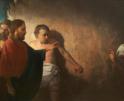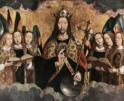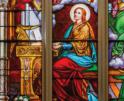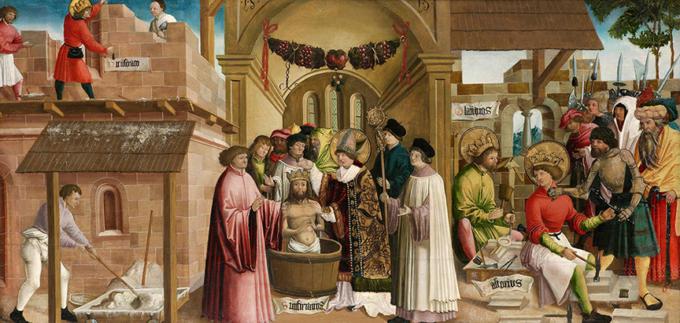
Faith
The church's honor roll is a large tome called the 'Roman Martyrology.'
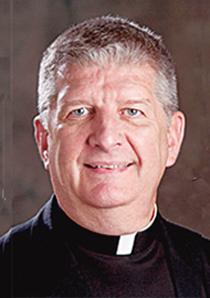
O’Grady
Do you recall your parents reviewing your report card? It was a quarterly experience each school year -- parochial or public. Did you ever get a nudge, push, or shove to do better so you could be "on the honor roll," that often elusive list of those who were excelling?
The church has such an honor roll, and you and I, always with the help of God's grace and the assistance of one another, especially by our prayers, by teachers of the faith, and by lived examples of the faith, are trying to get on the honor roll.
The church's honor roll is a large tome called the "Roman Martyrology." The present edition, available only in Latin, is over 800 pages. It is the last of the liturgical books published following the Second Vatican Council. It will be coming to a publisher near you once the arduous translation process, well underway for English speakers, is completed and the Holy See has given its approval.
First, let us look at the contents. The greater part of the book is a day-by-day arrangement of the names of the saints venerated in the church. Besides the saints, there are solemnities and feasts of both the Lord, (e.g., Annunciation, Nativity, and Easter) and of his Holy Mother (e.g., Immaculate Conception, Nativity, and Assumption). Within each month and day, they are generally organized chronologically. Included are those many saints who have been venerated since the church began. There are also saints from before the birth of Christ; Old Testament saints are listed. There is a substantial index with the saints alphabetically listed, so you can find your patron saint and check out the very succinct biography provided.
Since this is a liturgical book, it lays out the ways in which the daily proclamation of the martyrology can be made, although the various options might only be used in a monastery or in a seminary at Evening Prayer or Vespers. A parish could, on occasion, include the martyrology (when the approved English version becomes available) at daily Mass. This would be a fine means to keep before our eyes of faith that every Mass includes not only those of us assembled at that place and time but also those who once celebrated the Eucharist in their place and time and are in the mystery of Christ joined with us from their place in Eternal Life where they celebrate the Eucharist that never ends.
There is already a proclamation from the martyrology for Dec. 25. Many have heard this, most likely chanted in place of the penitential act, at the Mass at Night of Christmas.
This official list contains the names of those canonized by the church as well as those saints venerated before the process of beatification and canonization began.
Pope St. John Paul II increased the length of the martyrology, adding hundreds of saints and blesseds to the "honor roll." There were some who questioned the pope's "acceleration" of the processes. One of them asked the then-Joseph Cardinal Ratzinger about "making too many saints." With his customary pause, smile, and response, he said, "There is no such thing as 'too many saints,' the church's job is to make saints." Of course, the future pope was simply saying that it is God who makes saints, and God uses the church to accomplish this.
While this is the published honor roll, the church also celebrates that no calendar can contain the names of all saints. So, the church has a feast for those nameless numbers who, like the saints in the martyrology, are already in God's presence.
Back to the honor roll.
All of us in the church are called to be saints -- holy men and women. Christ left this challenge to us. He also gives us assistance, especially the seven sacraments of the church. It is not impossible to be a saint. But it takes work to get on the church's honor roll. Can you hear your parents?
And more good news: you do not have to be a martyr to get into the martyrology. As the word martyr means "witness," in this book, it lists all kinds of ways in which women and men, young and old, of every vocation, across the 2,000 years of the church's life have witnessed by their lives to the truth of the Gospel of Christ. They can serve as models of holiness of life for all of us in the church.
We strive each day to hear the words that the saints have already heard: "Well done good and faithful servant, now enter the joy of your Lord."
Recent articles in the Faith & Family section
-
Our Lady of DeliveranceJaymie Stuart Wolfe
-
The 'month of the dead' brings its own strange refreshmentBishop Robert Reed
-
Make New Friends, But Keep the OldMaureen Crowley Heil
-
A royal truthScott Hahn
-
St. Cecilia and hope in sacred songRichard Clark


